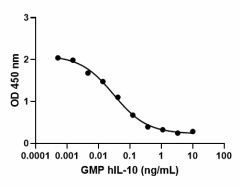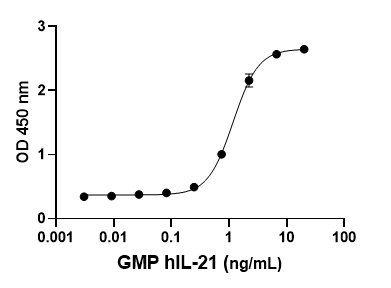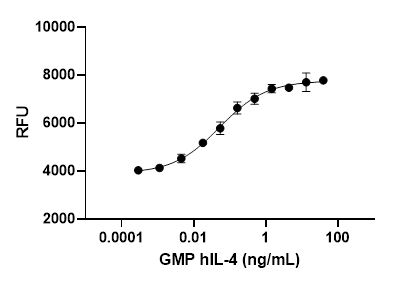- Other Names
- Interleukin-10, B-TCGF, CSIF, TGIF
- Ave. Rating
- Submit a Review
- Product Citations
- publications

-

GMP recombinant human IL-10 inhibits IFN-γ induction in PHA activated human PBMC in a dose-dependent manner with ED50 range of 0.025 - 0.25 ng/mL.
| Cat # | Size | Price | Quantity Check Availability | Save | ||
|---|---|---|---|---|---|---|
| 571014 | 25 µg | £381 | ||||
| 571016 | 100 µg | £1283 | ||||
IL-10 was first described as a cytokine that is produced by T helper 2 (Th2) cell clones. It inhibits interferon (IFN)-γ synthesis in Th1 cells, and therefore it was initially called cytokine synthesis inhibiting factor (CSIF). Macrophages are the main source of IL-10 and its secretion can be stimulated by endotoxin (via Toll-like receptor 4, NF-κB dependent), tumor necrosis factor TNF-α (via TNF receptor p55, NF-κB-dependent), catecholamines, and IL-1. IL-10 controls inflammatory processes by suppressing the expression of proinflammatory cytokines, chemokines, adhesion molecules, as well as antigen-presenting and costimulatory molecules in monocytes/macrophages, neutrophils, and T cells. IL-10 inhibits the production of proinflammatory mediators by monocytes and macrophages such as endotoxin- and IFN-γ-induced release of IL-1α, IL-6, IL-8, G-CSF, GM-CSF, and TNF-α. In addition, it enhances the production of anti-inflammatory mediators such as IL-1RA and soluble TNFα receptors. IL-10 inhibits the capacity of monocytes and macrophages to present antigen to T cells. This is realized by down-regulation of constitutive and IFN-γ-induced cell surface levels of MHC class II, of costimulatory molecules such as CD86 and of some adhesion molecules such as CD58.
Product DetailsBioLegend Cell-Vive™ GMP Recombinant proteins are manufactured and tested in accordance with USP Chapter 1043, Ancillary Materials for Cell, Gene and Tissue-Engineered Products and Ph. Eur. Chapter 5.2.12 in a dedicated GMP facility compliant with ISO 13485:2016. Specifications and processes include:
- Low endotoxin level (≤ 0.1 EU/μg)
- Purity (≥ 95% or higher)
- Bioburden testing
- Mycoplasma testing
- Batch-to-batch consistency
- Vendor qualification
- Raw material traceability and documentation
- Documented procedures and employee training
- Equipment maintenance and monitoring records
- Lot-specific certificates of analysis
- Quality audits per ISO 13485:2016
- QA review of released products
Product Details
- Source
- Human IL-10, amino acids Ser19-Asn178 (Accession # NM_000572), was expressed in E.coli.
- Molecular Mass
- The 160 amino acid recombinant protein has a predicted molecular mass of 18 kD. The DTT-reduced protein migrates at approximately 18 kD and the non-reduced protein migrates at approximately 15 kD by SDS-PAGE. The N-terminal amino acid is Serine.
-
N-terminal
Sequence Analysis - Ser-Pro-Gly-Gln-Gly-Thr-Gln-Ser-Glu-Asn
- Purity
- ≥ 95%, as determined by Coomassie stained SDS-PAGE
- Formulation
- 0.1 µm filtered protein solution is in 10 mM NaH2PO4, 150 mM NaCl, pH 7.2.
- Endotoxin Level
- Less than or equal to 0.1 EU per µg protein as determined by the LAL method
- Residual Host Cell Protein Content
- ≤ 0.500 ng/μg by ELISA
- Concentration
- 500 µg/mL
- Storage & Handling
- Unopened vial can be stored between 2°C and 8°C for up to 2 weeks, at -20°C for up to six months, or at -70°C or colder until the expiration date. For maximum results, quick spin vial prior to opening. The protein can be aliquoted and stored at -20°C or colder. Stock solutions can also be prepared at 50 - 100 µg/mL in appropriate sterile buffer, carrier protein such as 0.2 - 1% endotoxin-free BSA or HSA can be added when preparing the stock solution. Aliquots can be stored between 2°C and 8°C for up to one week or stored at -20°C or colder for up to 3 months. Avoid repeated freeze/thaw cycles.
- Activity
- ED50 = 0.025 - 0.25 ng/mL as determined by the dose-dependent inhibition of IFN-γ induction in PHA activated human PBMC. The specific activity of Cell-Vive™ GMP Recombinant Human IL-10 (carrier-free) is >1.3 x 106 IU/mg when compared against the WHO International Standard for Human IL-10 (NIBSC code: 93/722).
- Application
-
Bioassay
Cell Culture - Application Notes
-
BioLegend carrier-free recombinant proteins provided in liquid format are shipped on blue ice. Our comparison testing data indicates that when handled and stored as recommended, the liquid format has equal stability and shelf-life compared to commercially available lyophilized proteins after reconstitution. Our liquid proteins are verified in-house to maintain activity after shipping on blue ice and are backed by our 100% satisfaction guarantee. If you have any concerns, contact us at tech@biolegend.com.
- Disclaimer
-
BioLegend Cell-Vive™ GMP Recombinant proteins are for research use only. Suitable for ex vivo cell processing. Not for injection or diagnostic or therapeutic use. Not for resale. BioLegend will not be held responsible for patent infringement or other violations that may occur with the use of our products.
Antigen Details
- Structure
- Cytokine
- Distribution
-
IL-10 is produce by Th2 cells, macrophages, DCs, B cells, CD8+ T cells, regulatory T cells (Tregs), Th1 cells and Th17 cells. In addition, IL-10 is expressed by monocytes, B cells, eosinophils, and mast cells.
- Function
- IL-10 is an immunoregulatory cytokine. Its main function is the limitation and termination of inflammatory responses and the regulation of differentiation and proliferation of several immune cells such as T cells, B cells, natural killer cells, antigen-presenting cells, mast cells, and granulocytes.
- Interaction
- IL-10R is expressed in monocytes, NK, B and T cells. In addition, Langerhans cells, dermal dendritic cells, eosinophils, mast cells, and endothelial cells can respond to IL-10.
- Ligand/Receptor
- IL-10R1 and IL-10R2
- Biology Area
- Cell Biology, Immunology
- Molecular Family
- Cytokines/Chemokines
- Antigen References
-
- Fiorentino DF, et al. 1989. J Exp Med. 170:2081-2095.
- Ho AS, et al. 1993. P. Natl. Acad. Sci. USA. 90:11267-11271.
- Hart PH, et al. 1996. J Immunol. 157:3672-3680.
- Asadullah K, et al. 2003. Pharmacol Rev. 55:241-269.
- Mosser DM and Zhang X. 2008. Immunol Rev. 226:205-218.
- Maynard CL and Weaver CT. 2008. Immunol Rev. 226:219-233.
- Gene ID
- 3586 View all products for this Gene ID
- UniProt
- View information about IL-10 on UniProt.org
 Login / Register
Login / Register 



















Follow Us